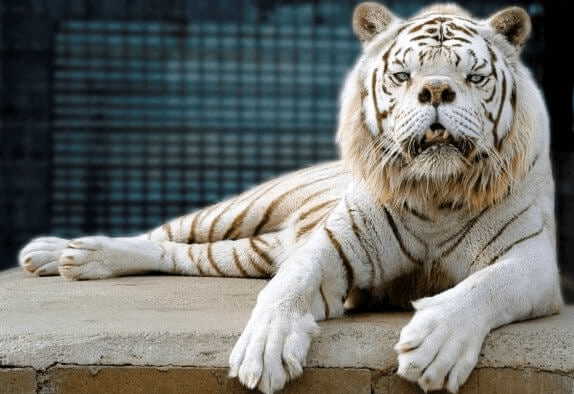Introduction
In the animal kingdom, lions reign as majestic creatures symbolizing strength and courage. However, what happens when we explore the intriguing concept of lions with Down syndrome? This article delves into this uncommon but thought-provoking topic, shedding light on what such a condition might entail for these fascinating big cats.
Read Also Lorena Cruz Mexican Singer 1966
Understanding Down Syndrome in Lions
Lions with Down syndrome represent a rare phenomenon where these powerful animals exhibit genetic variations leading to developmental differences. This condition, akin to its human counterpart, affects cognitive and physical aspects, creating a distinctive perspective on lion behavior and interaction within their ecosystem.
Causes and Development of Down Syndrome
The underlying causes of Down syndrome in lions often stem from chromosomal abnormalities, impacting their genetic makeup and subsequent neurological functions. While specific triggers remain a subject of ongoing research, the manifestation of this condition showcases the intricate genetic diversity within wildlife populations.
Symptoms and Challenges Faced by Affected Lions
Symptoms of Down syndrome in lions may include distinctive facial features, cognitive delays, and altered social behaviors. These challenges pose unique obstacles for affected individuals, influencing their adaptation strategies and survival within their natural habitats.
Behavioral Patterns and Social Dynamics
The presence of Down syndrome can influence lion behavioral patterns, affecting their interactions with pride members and overall social dynamics. Observing these nuances provides valuable insights into the complexities of animal cognition and communication.
Read Also Carla Diab Net Worth 2023
Care and Support for Lions with Down Syndrome
Ensuring the well-being of lions with Down syndrome requires specialized care and support tailored to their unique needs. Wildlife sanctuaries and conservation organizations play a pivotal role in providing a safe and nurturing environment for these individuals. From dietary considerations to behavioral enrichment, every aspect of their care is meticulously designed to enhance their quality of life.
Dietary Considerations
Proper nutrition is essential for lions with Down syndrome to thrive. Caretakers and veterinarians collaborate to develop customized diet plans that address their nutritional requirements while considering any dietary restrictions or sensitivities they may have. Regular health assessments and monitoring help maintain their overall health and well-being.
Behavioral Enrichment
Engaging in natural behaviors is vital for the mental and emotional well-being of lions with Down syndrome. Behavioral enrichment activities, such as interactive toys, scent trails, and simulated hunting experiences, stimulate their cognitive abilities and promote physical activity. These enrichment programs aim to reduce stress and boredom while encouraging natural behaviors.
Veterinary Care and Monitoring
Regular veterinary check-ups and medical monitoring are crucial aspects of caring for lions with Down syndrome. Skilled veterinarians assess their health status, address any medical concerns promptly, and implement preventive measures to ensure optimal health outcomes. Close monitoring allows for early intervention and personalized care plans as needed.
Read Also Carla Diab Net Worth
Ethical Considerations and Conservation Efforts
Ethical considerations surrounding the conservation of lions with Down syndrome encompass a range of topics, including welfare standards, habitat preservation, and genetic diversity. Conservation efforts strive to strike a balance between preserving natural ecosystems and providing compassionate care for individual animals with unique needs.
Welfare Standards
Upholding high welfare standards is paramount in conservation efforts involving lions with Down syndrome. This includes promoting ethical treatment, minimizing stressors, and prioritizing the animals’ physical and psychological well-being. Collaborative initiatives between wildlife experts, veterinarians, and behavioral specialists ensure that ethical standards are met at every stage of care.
Habitat Preservation
Preserving natural habitats is essential for the long-term survival of lions, including those with Down syndrome. Conservation initiatives focus on habitat restoration, anti-poaching measures, and sustainable land management practices to safeguard critical ecosystems. By protecting their natural environments, conservationists support the overall health and resilience of lion populations.
Genetic Diversity and Breeding Programs
Maintaining genetic diversity is a key consideration in conservation programs for lions with Down syndrome. Responsible breeding practices aim to preserve genetic variability within captive populations while minimizing the risk of inherited disorders. Genetic research and pedigree analysis inform breeding decisions, ensuring healthy offspring and population sustainability.
Public Perception and Awareness
Public perception plays a crucial role in shaping attitudes towards lions with Down syndrome and conservation efforts. Education, advocacy, and community engagement initiatives are instrumental in fostering positive relationships between humans and wildlife, promoting empathy, and encouraging responsible stewardship of natural resources.
Education and Outreach
Educational programs and outreach activities raise awareness about the challenges faced by lions with Down syndrome and the importance of conservation. Schools, zoos, and community organizations collaborate to deliver engaging educational content, interactive experiences, and conservation-themed events that inspire public interest and participation.
Advocacy and Support
Advocacy efforts mobilize support for wildlife conservation policies, funding initiatives, and ethical wildlife management practices. Conservation organizations, advocacy groups, and concerned individuals work together to champion conservation causes, raise funds for critical projects, and advocate for legislative measures that protect endangered species and their habitats.
Responsible Tourism and Engagement
Responsible tourism practices promote sustainable wildlife viewing experiences that prioritize animal welfare and conservation ethics. Visitors to wildlife sanctuaries and protected areas learn about conservation challenges, observe animals in their natural habitats with minimal disturbance, and contribute to conservation efforts through eco-friendly practices and financial support.
By fostering positive public perception and raising awareness, we can create a collective impact that supports the well-being of lions with Down syndrome and promotes conservation efforts for wildlife conservation as a whole.
Read Also How Did Biggie Cheese Die
Future Research and Potential Discoveries
Continued research into Down syndrome in lions holds promise for uncovering new insights and potential discoveries in wildlife genetics and behavior. Collaborative efforts across scientific disciplines pave the way for innovative approaches to wildlife conservation and management.
Conclusion
In conclusion, exploring the concept of lions with Down syndrome offers a poignant reminder of the diverse tapestry of life in the natural world. Embracing this diversity not only enriches our understanding of wildlife but also underscores the importance of inclusive conservation practices for safeguarding all species.
FAQs: Frequently Asked Questions
- What are the main characteristics of Down syndrome in lions?
- Lions with Down syndrome may exhibit distinctive facial features, cognitive delays, and altered social behaviors.
- How do conservation efforts support lions with Down syndrome?
- Conservation efforts focus on providing specialized care, promoting awareness, and fostering ethical management practices for these unique individuals.
- What challenges do lions with Down syndrome face in their natural habitats?
- Lions with Down syndrome face challenges related to adaptation, social interactions, and survival strategies within their ecosystems.
- Are there any ongoing research initiatives on Down syndrome in lions?
- Yes, ongoing research initiatives explore the genetic, behavioral, and ecological aspects of Down syndrome in lions, aiming to uncover new insights and potential solutions.
- How can the public contribute to supporting lions with Down syndrome?
- The public can contribute by supporting reputable wildlife conservation organizations, participating in educational programs, and advocating for ethical wildlife management practices.





 A Deep Dive into LGV10DecemberPromo Fallixin GoToWorkBooth DJHelenStride and Ojyamappu
A Deep Dive into LGV10DecemberPromo Fallixin GoToWorkBooth DJHelenStride and Ojyamappu